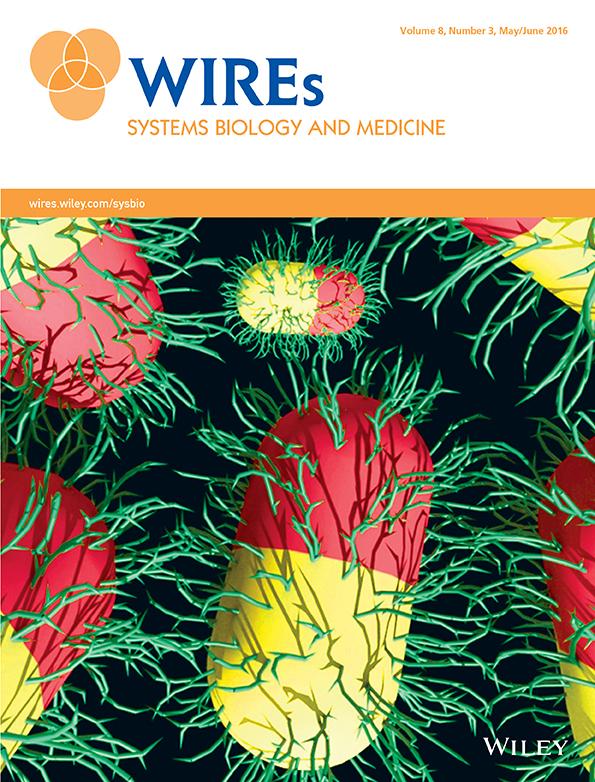Cancer and inflammation
IF 7.9
Q1 Medicine
Wiley Interdisciplinary Reviews-Systems Biology and Medicine
Pub Date : 2017-03-01
DOI:10.1002/wsbm.1370
引用次数: 181
Abstract
The relationship between inflammation and cancer has been recognized since the 17th century,1 and we now know much about the cells, cytokines and physiological processes that are central to both inflammation and cancer.2-9 Chronic inflammation can induce certain cancers,10-17 and solid tumors, in turn, can initiate and perpetuate local inflammatory processes that foster tumor growth and dissemination.5,18-20 Consequently, inflammatory pathways have been targeted in attempts to control cancer.21-23 Inflammation is a central aspect of the innate immune system's response to tissue damage or infection, and also facilitates the recruitment of circulating cells and antibodies of the adaptive immune response to the tissue. Components of the innate immune response carry out a robust, but sometimes overly‐conservative response, sacrificing specificity for the sake of preservation. Thus, when innate immunity goes awry, it can have profound implications. How the innate and adaptive immune systems cooperate to neutralize pathogens and repair damaged tissues is still an area of intense investigation. Further, how these systems can respond to cancer, which arises from normal ‘self’ cells that undergo an oncogenic transformation, has profound implications for cancer therapy. Recently, immunotherapies that activate adaptive immunity have shown unprecedented promise in the clinic, producing durable responses and dramatic increases in survival rate in patients with advanced stage melanoma.24-26 Consequently, the relationship between cancer and inflammation has now returned to the forefront of clinical oncology. WIREs Syst Biol Med 2017, 9:e1370. doi: 10.1002/wsbm.1370癌症和炎症
炎症和癌症之间的关系自17世纪以来就已被认识到,现在我们对炎症和癌症的核心细胞、细胞因子和生理过程了解得很多。2-9慢性炎症可以诱发某些癌症,10-17和实体瘤,反过来,可以启动和延续局部炎症过程,促进肿瘤的生长和传播。5,18-20因此,炎症途径已成为控制癌症的目标。21-23炎症是先天免疫系统对组织损伤或感染反应的一个核心方面,也促进了循环细胞和适应性免疫反应抗体对组织的招募。先天免疫反应的组成部分进行稳健的,但有时过于保守的反应,牺牲特异性为了保存。因此,当先天免疫出现问题时,可能会产生深远的影响。先天免疫系统和适应性免疫系统如何合作来中和病原体和修复受损组织仍然是一个深入研究的领域。此外,这些系统如何对癌症做出反应,癌症是由正常的“自我”细胞经历致癌转化而产生的,这对癌症治疗具有深远的意义。最近,激活适应性免疫的免疫疗法在临床中显示出前所未有的希望,在晚期黑色素瘤患者中产生持久的反应并显着提高生存率。因此,癌症和炎症之间的关系现在又回到了临床肿瘤学的前沿。中国生物医学工程学报,2017,32(1):444 - 444。doi: 10.1002 / wsbm.1370
本文章由计算机程序翻译,如有差异,请以英文原文为准。
求助全文
约1分钟内获得全文
求助全文
来源期刊

Wiley Interdisciplinary Reviews-Systems Biology and Medicine
MEDICINE, RESEARCH & EXPERIMENTAL-
CiteScore
18.40
自引率
0.00%
发文量
0
审稿时长
>12 weeks
期刊介绍:
Journal Name:Wiley Interdisciplinary Reviews-Systems Biology and Medicine
Focus:
Strong interdisciplinary focus
Serves as an encyclopedic reference for systems biology research
Conceptual Framework:
Systems biology asserts the study of organisms as hierarchical systems or networks
Individual biological components interact in complex ways within these systems
Article Coverage:
Discusses biology, methods, and models
Spans systems from a few molecules to whole species
Topical Coverage:
Developmental Biology
Physiology
Biological Mechanisms
Models of Systems, Properties, and Processes
Laboratory Methods and Technologies
Translational, Genomic, and Systems Medicine
 求助内容:
求助内容: 应助结果提醒方式:
应助结果提醒方式:


